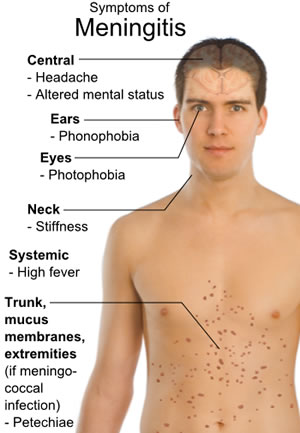Meningitis is the inflammation of the membranes that cover the brain and the spinal cord. Inflammation and infection of the meninges is often a life threatening medical condition as it can lead to brain infection and infection in the blood stream or septicaemia which can be fatal.
Meningitis may be caused by bacteria or by viruses. Viral meningitis usually is more common and runs a milder course while bacterial meningitis is a medical emergency.

By Mikael Häggström, via Wikimedia Commons
Bacterial meningitis symptoms
Bacterial meningitis is the more serious form of the condition. Symptoms begin suddenly and worsen rapidly. Meningitis commonly affects children and elderly but may affect all age groups.
Initial warning symptoms
Some of the initial warning symptoms include:
- body ache and muscle pain in limbs and joints
- shivering and cold hands and feet
- bluish lips and pale skin
- high fever
Early symptoms
Early symptoms of bacterial meningitis include:
- feeling generally unwell
- severe unrelenting headache
- usually a very high fever
- nausea and vomiting
Later symptoms
As the disease progresses the symptoms include:
- drowsiness
- confusion
- seizures or fits
- being unable to tolerate bright lights (photophobia) – this is less common in young children
- stiff neck – less common in young children - the neck becomes stiff and it is difficult to bend the neck forwards
- rapid breathing rate, rapid heart rate, respiratory distress, altered mental state (confusion and delirium), poor urine output and extremely low blood pressure – this is a symptom of septicaemia and shock
- blotchy red rash which is characteristic and does not fade or change colour when pressed with a glass slide. This is not always present - a rash is strongly suggestive of meningococcal septicaemia and should lead to urgent treatment and referral
- Kernig's sign refers to pain and resistance on straightening the knees with the hips folded - this detects back stiffness and is characteristic of meningitis
- Brudzinski's sign refers to pain and resistance on bending the head forward with the hips folded
- focal paralysis and neurological deficits and abnormal pupils
Bacterial meningitis symptoms in young children
Young children and infants have some different symptoms that indicate meningitis. These include:
- initial symptoms are those of irritability and refusal to be held or fed
- becoming floppy and unresponsive
- the baby may be stiff with jerky movements
- unusual crying, shrill cry or unusual moaning
- vomiting and refusing feeds
- pale and blotchy skin
- staring expression
- very sleepy or drowsy with a reluctance to wake up
- swelling of the soft part on the top of the head called the fontanelle
Viral meningitis symptoms
Viral meningitis is more common than bacterial meningitis. The illness appears much like flu and may have milder symptoms.
Common symptoms
Common symptoms of viral meningitis include:
- headaches
- fever
- generally not feeling very well
More severe symptoms
In more severe cases of viral meningitis symptoms may be:
- nausea and vomiting
- neck stiffness
- muscle or joint pain
- diarrhoea
- photophobia (sensitivity to light)
Sources
- http://www.nhs.uk/Conditions/Meningitis/Pages/Symptoms.aspx
- http://www.patient.co.uk/doctor/Meningitis.htm
- https://www.bbc.com/
- https://www.ncbi.nlm.nih.gov/
- https://www.ohsu.edu/
- https://www.choa.org/
Further Reading
Last Updated: Jul 8, 2023